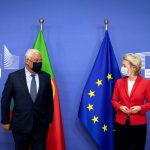2020 – The Good, the Bad and the Ugly
The year 2020 is one that most people – the Portuguese and those with which she does business – will want to forget.
But in the midst of so much mayhem, there were important deals, development and achievements as well as major investments among the metaphorical flotsam and jetsam of misery and woe washed up by the tide of the Covid-19 pandemic on the beaches of Portugal’s fortunes.
Essential Business takes stock of what was ‘Good,’ what was ‘Bad’ and what was downright ‘Ugly’ for Portugal, Europe’s most south-westerly nation and EU Member-State, in 2020.
The Good
So what were the big ticket deals that made 2020 and got overlooked by the pandemic, State of Emergency, travel restrictions and economic gloom.
The sale by Spanish media group Prisa of its 30.22% stake in Portuguese television and media group Media Capital for €10.5 million was a landmark deal of the year and involved the buyer and new owner of the 30% stake, Portuguese impresario Mário Ferreira. In November, after signing various agreements with other Portuguese investors, Media Capital now has several investors including Grupo Lusiaves (23%) among others.
Grupo José de Mello and Arcus closed the sale of the majority capital share (81.1%) in motorways company Brisa to overseas institutional investors in the form of a consortium comprising APG (the asset management arm of ABP, a Dutch pensions fund), NPS (the national pensions service of the Republic of Korea) and SLAM (an asset management arm for insurer Swiss Life) for a rumoured €3Bn or more.
Cellnex purchased the MEO and Nos receiver towers in one of the biggest telecoms deals of 2020. In January, the company bought 100% of OMTEL for €800,000 from Altice Portugal and from a consortium comprising Morgan Stanley and a company belonging to Pires de Lima and Sérgio Monteiro. It then acquired Nos Towering from a subsidiary of Nos which managed the company’s telecoms towers and paid €375 million to acquire the 2,000 towers. Cellnex then announced a €75 million expansion plan.
Despite the pandemic and its effects on the Portuguese economy, emergency bond-buying by the European Central Bank has kept down the cost of government borrowing, as it did during the debt crisis. In contrast to the bailout years, Portugal will receive €13Bn in grants by 2026 from the EU’s recovery fund — or 6% of GDP – with plans to minimise borrowing from it so as not to add to the public debt.
Certain sectors of Portugal’s economy may have gone to the dogs, but real estate investment generated by liquidity from pension and other funds meant that Portugal’s property market boomed as uncertainty drove cash to safer long-term assets in bricks and mortar despite the market falling 4% overall in 2020 on 2019. The old adage ‘as safe as houses’ remained true for Portugal in 2020 as it maintained its popularity as an investment destination. In fact, overseas private investors bought no less than 233 residential properties in Lisbon during the lockdown alone while fund-backed investment in big ticket developments and commercial operations enjoyed another bumper year with transactions in excess of €2.3Bn according to data from Marketbeat Portugal Autumn 2020 from Cushman & Wakefield – an increase of 36% on 2019 which had been good year in itself.
The Bad
A dreadful year for the Portuguese tourism industry and hotel, restaurant and bars sectors as well as organisations behind events, concerts, weddings, shows and forms of entertainment in general as the State of Emergency, the reduction of flights and routes, border restrictions and curfews throughout the year from March onwards began to bite. After a bumper year in terms of tourism numbers and revenues in 2019 – 8.5% of GAV – the tourism and hospitality sectors tanked in 2020 losing the country around 40% in visitor numbers by April 2020 alone. In fact, Portugal’s dependence on tourism, the sector that helped drive the country’s economic recovery from the Great Recession of 2009-2014, accounting for 15% of national output and 9% of employment, mean that 60,000 jobs were lost in 2020, 45% of the country’s hotels remained closed over the year, rising to 70% for November and December.
After Portuguese finance minister and financial wiz-kid Mário Centeno’s valiant attempts to actually start tackling Portugal’s annual budget and accumulated deficits, the pandemic undid the results of 10 years of fiscal good house keeping with the reawakening of Portugal’s debt crisis trauma. More than two-thirds of the 360,000 jobs created over the past five years were under threat as Portugal’s 25th quarter of uninterrupted growth came to an abrupt end, leaving the Government’s first budget surplus in 45 years a seemingly short-lived mirage. The immediate effects of the crisis were far greater than the 2009-2014 crisis, with an 8.1% contraction of the economy on 2019 and unemployment at 9% for the year. The European Commission expects public debt to reach 135% of GDP for 2020 up from 117% in 2019. The budget is expected to return to a deficit of 4.3% of GDP in 2020.
Strained relations surfaced in 2020 between the US and Portugal as China showed an interest in commercially be involved in constructing and managing Portugal’s port operations at Sines south of Lisbon. The US was already unhappy at the prospect of Chinese technology company Huawei constructing part of Portugal’s 5G network. However, Portuguese Foreign Minister Augusto Santos Silva told US Secretary of State Mike Pompeo that Portugal will not exclude China from supplying technology for the country’s next-generation 5G wireless network. In a bilateral meeting taking place in Lisbon in November, Secretary of State Pompeo made efforts to persuade the Portuguese authorities to prevent Huawei from providing hardware that operates the new ultra-fast 5G networks. At a joined news conference with the Portuguese Foreign Minister, Secretary of State Pompeo, warned that Chinese government “won’t hesitate” to use Huawei as a tool to access sensitive data.“We have tried for these past couple of years to make clear to our friends all around the world of the attendant risks,” the US Secretary of State said.Foreign Minister Santos Silva reiterated that any bids from 5G Chinese operators “will be assessed in the light of strict Portuguese and EU regulations,” and that “Each country will make its own decisions about such matters.” He also said all foreign investment is welcome, including from US companies.It has been reported that wireless carrier ‘Altice Portugal’ has already partnered with Huawei which prepares to launch the service in Portugal in 2020. Chinese companies have already acquired significant assets in Portugal in many sectors such as energy, banking and insurance.Other European countries have also been pressured by Washington to avoid partnering with Huawei under the suspicion that it may compromise cybersecurity by engaging in cyber-espionage with Beijing. The allegations have been denied by both Huawei and Beijing.
The Ugly
The mooted €3.5Bn restructuring of national airline carrier TAP involving an initial €1.2Bn loan from the State and included in the nation’s financial accounts or State Budget for 2021. The year also saw the exit of TAP co-owner David Neeleman, of JetBlue fame who was a key member of the private consortium Atlantic Gateway. In July the Portuguese government announced it would strengthen state share in the airline from 50% to 72.5%. The EU-approved and demanded restructuring plan for TAP involves the redundancy of 2,000 staff over the coming years, while the remainder will have to take a 25% salary cut.
Chinese construction giant purchased 23% of the capital in Portuguese construction company Mota-Engil by snapping up 55 million shares for €169.4 million, pushing the value of the construction firm up to €740 million.
An inquiry was launched into alleged mismanagement and malpractice at the Portuguese high-street bank Novo Banco which is owned by a US vulture capital fund Lone Star, and which has required billions of euros to keep afloat since its creation in 2014 from a Resolution Fund dubbed the “worst in European Union history” by Portugal’s own former finance minister Mário Centeno.
Luanda Leaks – Voted by Jornal Económico as the ‘National Event of the Year’ – the 715,000 documents relating to the business empire of Angolan tycoon Isabel dos Santos revealed a trail of fraud, money laundering and theft from the Angolan people and public institutions with funds being laundered through Portuguese financial entities and overseas shell companies, as well as a shopping basket full of shareholdings in Portuguese companies purchased with ill-gotten agains. The case made international headlines and called into question Portugal’s ability to supervise, regulate and police its financial and commercial institutions.
Portugal’s super judge Carlos Alexandre succeeded in getting the CEO of EDP, António Mexia, and the CEO of EDP Renováveis removed from the EDP board and charged for their involvement in the excessive rents case. The two had to stump up a €2 million bail to keep them out of jail as they stood accused of manipulating the market by charging excessive rental fees which harmed both Portuguese consumers and the State.
Portugal’s Public Ministry accused 19 individuals and 17 companies for being the key figures behind the collapse of the Banco Espírito Santo Group in 2014 with Ricardo Salgado having to answer to crimes of criminal association among others, such as tax evasion and money laundering.










